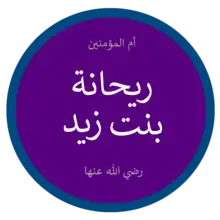Rayhana bint Zayd
Rayhānah bint Zayd (Arabic: ريحانة بنت زيد) was a Jewish woman from the Banu Nadir tribe, who became a wife of the Islamic prophet Muhammad, after the Incident of Banu Qurayza in 627 CE (5 AH).[1][2][3] She is considered by some Muslims as being one of Muhammad's wives.
Rayhana bint Zayd Mother of the Believers | |
|---|---|
| ريحانة بنت زيد | |
 | |
| Born | Unknown |
| Died | 51 A.H.; c. 631 Medina, Hejaz (present-day Saudi Arabia) |
| Resting place | Al-Baqi Cemetery, Medina |
| Spouse | Muhammad (m. 627; till her death in 631 CE) (disputed) |
| Family | Banu Nadir (by birth) |
Biography
Rayhana was born into the Banu Nadir tribe, and became part of the Banu Qurayza tribe upon her marriage.[4][5]
Ibn Sa'd wrote that Rayhana went on to be manumitted and subsequently married to Muhammad upon her conversion to Islam.[6][7] Al-Tha'labi agreed that she became one of Muhammad's wives and cited evidence that he paid a mahr for her. Ibn Hajar makes reference to Muhammad giving Rayhana a home upon their marriage.[8] Antonie Wessels suggested that Muhammad married Rayhana for political reasons due to her dual affiliation with both the Banu Nadir and Banu Qurayza tribes, while Lesley Hazleton felt it was evidence of Muhammad creating alliances.[9][10] Conversely, Barakat Ahmad felt such rationale to support the notion of Rayhana and Muhammad's marriage was "meaningless" due to the annihilation of both tribes by Muhammad's forces.[11]
Similar to Maria al-Qibtiyya, there is not universal consensus among Islamic scholars as to whether Rayhana was officially one of Muhammad's wives.[12][13][14][15] Hafiz ibn Minda and Shibli Nomani, for example, believed that she returned to the Banu Nadir upon her manumission.[16]
Rayhana died in 631, 11 days after hajj, and was buried at the Al-Baqi Cemetery in Medina along with other wives of Muhammad.[17]
References
- Tabari, Al (25 September 1990), The last years of the Prophet (translated by Isma'il Qurban Husayn), State University of New York Press, ISBN 9780887066917
- Rodinson, Muhammad: Prophet of Islam, p. 213.
- Rahman al-Mubarakpuri, Safiur (2005), The Sealed Nectar, Darussalam Publications, p. 189, ISBN 9798694145923 (online).
- Rahman al-Mubarakpuri, S. (2005). The Sealed Nectar. Darussalam: Darussalam Editing, p. 201.
- Abdul-Rahman, M. S. (2009). Tafsir Ibn Kathir Juz’ 21 (Part 21): Al-Ankabut 46 To Al-Azhab 30. Londra: MSA Publication Limited, p. 213.
- Guillaume, Alfred. The Life of Muhammad: A Translation of Ibn Ishaq's Sirat Rasul Allah, p. 466. Oxford University Press, 1955. ISBN 0-19-636033-1
- Ibn Sa'd. Tabaqat. vol VIII, pg. 92–3.
- Ibn Hajar. Isabaha. Vol. IV, pg. 309.
- Ostle, R. C. (1974). "Antonie Wessels: A modern Arabic biography of Muḥammad: a critical study of Muḥhammad Ḥusayn Haykal's Hayāt MuḤammad. xii, 272 pp. Leiden: E. J. Brill, 1972. Guilders 50". Bulletin of the School of Oriental and African Studies. 37 (3): 689–690. doi:10.1017/s0041977x00127673. ISSN 0041-977X. S2CID 161497336.
- Hazleton, Lesley (2013). The first Muslim : the story of Muhammad. New York. ISBN 978-1-101-60200-3. OCLC 858946813.
{{cite book}}: CS1 maint: location missing publisher (link) - Ahmad, Barakat (1979). Muhammad and the Jews : a re-examination. Indian Institute of Islamic Studies. New Delhi: Vikas. ISBN 0-7069-0804-X. OCLC 6330142.
- Bennett, Clinton, ed. (1998). In Search of Muhammad (reprint ed.). A&C Black. p. 251. ISBN 9780304704019.
- Fred James Hill; Nicholas Awde (2003). A History of the Islamic World (illustrated ed.). Hippocrene Books. p. 24. ISBN 9780781810159.
- Jerome A. Winer (2013). Winer, Jerome A.; Anderson, James W. (eds.). The Annual of Psychoanalysis, V. 31: Psychoanalysis and History. Routledge. p. 216. ISBN 9781134911820.
- David S. Powers (2011). Muhammad Is Not the Father of Any of Your Men: The Making of the Last Prophet. University of Pennsylvania Press. p. 8. ISBN 9780812205572.
- Nomani, Shibli (1979). The Life of the Prophet. Vol. II, pg. 125–6
- al-Halabi, Nur al-Din. Sirat-i-Halbiyyah. Uttar Pradesh: Idarah Qasmiyyah Deoband. vol 2, part 12, pg. 90. Translated by Muhammad Aslam Qasmi.
